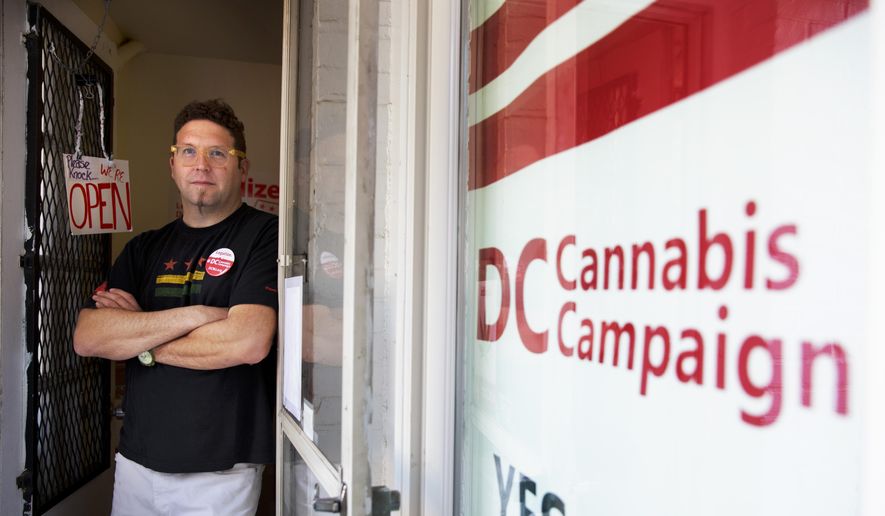D.C. marijuana advocates say they are girding for battle now that the Trump administration has said it intends to enforce federal laws on pot possession and distribution.
But the District, which has legalized recreational marijuana but not its sale, probably doesn’t run afoul of federal law, a leading local advocate says.
“D.C. is not really in the line of fire for enforcement,” Kaitlyn Boecker of the Drug Policy Alliance said Monday. “With a lack of regulated sales, there’s not much for the [Department of Justice] to crack down on.”
White House press secretary Sean Spicer on Thursday said the administration views recreational pot use as a violation of federal law and will begin enforcement in states that have legalized marijuana.
Along with the District, Alaska, California, Colorado, Connecticut, Maine, Nevada, Oregon and Washington have legalized recreational marijuana.
Ms. Boecker said the Justice Department likely would focus on markets for regulated sales of pot. She cited a DOJ guidance commonly referred to as the Cole memo, which identifies eight priorities for federal drug enforcement agents. Drug trafficking and sales to minors top the list. Possession on federal land is last, and possession on nonfederal land is not included.
Congress blocked the District from creating a market for pot sales when city voters legalized the drug in 2015.
“If anything, the Cole memo should be a comfort to District residents and lawmakers, as it shows the chances of federal interference with our tightly controlled program are extremely low,” Ms. Boecker said.
But city pot activists are still preparing for a fight, just not with the White House. Adam Eidinger of marijuana advocacy group DCMJ said their target will be Congress.
Mr. Eidinger, who was instrumental in legalizing cannabis in the District, said the group has scheduled on April 24 a smokeout on the east side of the U.S. Capitol. DMCJ rescheduled the 4/20 event because Congress won’t be in session on the nationally recognized pot celebration “holiday.”
The activist group held a similar event last year outside the White House. No arrests were made, and the two citations that were issued were later nullified.
Mr. Eidinger said things would likely be more messy this year.
“If they choose to arrest us, the so be it,” he said.
On its website, DCMJ sent out a national call to marijuana groups asking for help, and group members plan to light up in congressional offices.
However, Mr. Eidinger has different plans for the White House, saying he’d gladly meet with President Trump about marijuana policy, even if that rouses the ire of others on the left.
“I’m willing to take the heat from others,” he said. “I would set every other issue I have with Trump aside to work with him on this. It’s that important.”
The Trump administration’s decision reverses the Obama-era policy of not interfering with local legalization laws. Over the last eight years, federal drug agents have focused more on the opioid epidemic and drug trafficking.
The announcement also is a reversal of Mr. Trump’s position on the campaign trail. At a Reno, Nevada, rally in October 2015, the then-candidate said states should decide how to handle legalization and enforcement.
“In terms of marijuana and legalization, I think that should be a state issue, state-by-state,” Mr. Trump said at the time.
D.C. Attorney General Karl Racine said he’d operate based on the will of city residents when it comes to marijuana laws.
“One of the reasons voters favored legalization was the disparate impact marijuana arrests and convictions were having on communities of color,” Mr. Racine said. “While the administration has not clarified its comments with policy or an executive order, I believe that federal prosecutors have much larger public safety priorities in the District of Columbia than prosecuting the possession of small amounts of marijuana.”
Mayor Muriel Bowser has taken a hard stance against some of Mr. Trump’s policies, including his opposition to sanctuary cities. The president’s marijuana enforcement decision is no different.
“Our goal is to always be vigilant and work aggressively against any federal actions that undermine our local laws,” Bowser spokesman Kevin Harris said Monday. “Should there be movement on this issue that we feel undermine our local laws, we would continue our ongoing advocacy to preserve and protect our right to govern ourselves.”
Mr. Harris said that the mayor would stand up for what the city’s residents have said they want for the city.
“We do not see this as an issue where federal intervention is necessary, but if that is the direction the administration decides to pursue, we would look for ways to protect our local law, which was debated and approved by lawmakers actually elected by D.C. residents,” he said.
• Ryan M. McDermott can be reached at rmcdermott@washingtontimes.com.




Please read our comment policy before commenting.